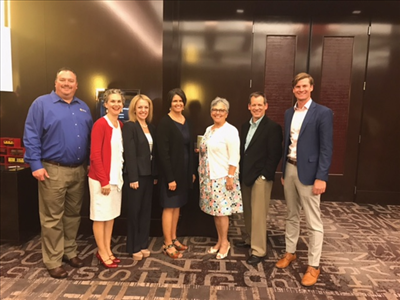
Photo left to right: Larry Palochik, SVP of Member Solutions for the California and Nevada Credit Union Leagues; Tena Lozano, Executive Director of the Richard Myles Johnson Foundation; Kathryn Davis, CEO of BALANCE; Gigi Hyland, Executive Director of the National Credit Union Foundation; Diana Dykstra, President and CEO of the Leagues; Lee Alderman, AVP of Training and Financial Literacy for Redwood CU; and Evan Willingham, VP of Business Development for EverFi.
More than 50 professionals from across the country who are exploring how to effectively measure financial capability for credit union members came together last week during the Financial Capability Colloquium to expand upon their growing coalition, which is committed to “owning” this topic.
Hosted by the California and Nevada Credit Union Leagues, the National Credit Union Foundation (the Foundation) and BALANCE in Las Vegas from April 19 – 21, this second annual event spearheaded an ongoing conversation about what defines “financial capability,” how it is attained, and how to tell a powerful story that will resonate with consumers.
“I was excited to see a variety of practitioners from across the nation come together to share their perspectives,” said Larry Palochik, senior vice president of member solutions for the Leagues. “What’s interesting is that we are measuring ‘financial capability,’ which is something that nobody else is measuring today.”
It wasn’t by coincidence the colloquium was held in April—also known as “Financial Literacy Month,” a period when credit unions are reminding the public about the importance of financial education.
The colloquium has been building upon a key foundational principle: that financial education leads to financial literacy, which can then lead to financial capability and eventually financial well-being. The event began with a reception Wednesday evening before diving into a two-day experience with mini-sessions on what financial capability looks like through the national lens; the dynamics behind funding financial health and segmentation; how to measure capability and well-being; exploring the advancement of credit union efforts; being aware of the community aspects of financial capability; and the colloquium’s next steps.
Palochik said the hosts of the colloquium will provide a “CU Financial Capability Survey” that’s been developed for credit unions to use on their members this summer—a total of 15 questions that measure financial capability based on how consumers feel about their finances and whether their behavior is aligned with those feelings. The survey incorporates questions developed by the colloquium, the University of Wisconsin, and the Consumer Financial Protection Bureau (CFPB).
“We will probably receive 30,000 – 40,000 consumer and credit union member responses that will fuel some great talking points,” Palochik said. “Our efforts will hopefully amount to one of the most broad-based credit union pilots on this topic.”
Gigi Hyland, executive director of the Foundation, said that “how” organizations measure a person’s financial health and well-being is a “big topic” nationally. “Credit unions do an awful lot of financial education, but they need to be part of the national dialogue on how to measure what truly advances members’ financial health. This effort will, for the first time, give credit unions a tool to start looking at how members feel and act about their finances.”
Presentations were made by representatives from the Leagues, the Foundation, BALANCE, the Center for Financial Services Innovation (CFSI), Corporation for Enterprise Development (CFED), Cities for Financial Empowerment Fund, EverFi, CFPB, Center for Financial Security, Redwood Credit Union, and the Richard Myles Johnson (RMJ) Foundation (“Bite of Reality”).
“All the speakers were engaging, and I believe we all left energized and ready to make a difference in the lives of our members,” said Kristin Crellin, vice president of school and community relations for SchoolsFirst FCU, and just one attendee out of several who said they felt positively impacted by the event. “We all recognize how important it is to bring financial well-being to our members—and now, financial capability will help our members make better financial decisions.”
Jonathan Meyer, vice president of marketing and community relations for San Mateo CU, said it was his first year attending the colloquium. He was impressed by the excitement and enthusiasm the event generated.
"Having a smaller group allowed for in-depth conversations and the sharing of ideas at a level rarely seen at a conference," he said. "Knowing that the credit unions and industry partners who attended are all entering this realm of measuring financial health together at the ground level is inspiring. I don’t often leave these types of events with the idea that 'this could be big,' but that’s how this one struck me."
The Financial Capability Colloquium was sponsored by EverFi, an education technology innovator that empowers learners with the skills that prepare them to be successful in life.
The California and Nevada Credit Union Leagues
The California and Nevada Credit Union Leagues are based in Ontario, CA and are the state trade associations for 328 credit unions headquartered in California and 17 headquartered in Nevada. The Leagues represent the interests of more than 11 million individuals across both states who are member-owners of their credit unions. Credit unions help consumers afford life and prosper!